|
Produced by The Center for Baptist
Studies, Mercer University
A Monthly EMagazine, Bridging Baptists
Yesterday and Today
Bruce T. Gourley,
Editor, The
Baptist Studies Bulletin
Wil Platt, Associate Editor, The Baptist Studies
Bulletin
|
| |
| |
|
| |
|
|
In Response to . . . :
Currently the Interim Director of the Center for Baptist
Studies, Bruce has been on the staff of the Center since 2004. He
previously served as a campus minister and professor of church history.
In addition, he is involved in a number of areas of moderate Baptist life
through the medium of the Internet.
"The Top Baptist Story of
2007 and 2008"
By Bruce T. Gourley

Each December religious news publications make a point to recap the annual
"Top Ten" stories as voted upon by journalists. But in 2007,
Associated
Baptist Press' survey of journalists, bloggers and public-relations
professionals resulted in a most unusual conclusion: the top Baptist story of
the year . . . did not happen in 2007. In fact, the event in question has
yet to happen, but is very likely to also be the top Baptist story for 2008.
I am speaking of
the upcoming
New Baptist Covenant Celebration, the highly-anticipated gathering in
Atlanta of diverse Baptists from throughout North America which you've heard
us speak of frequently in the Baptist Studies Bulletin this past year.
No other Baptist story in 2007 even came close to matching the significance of
the mere lead-up to the New Covenant Celebration, according to the ABP survey.
Former U.S. President Jimmy Carter is of the opinion that the upcoming
gathering is the
most significant and diverse Baptist convocation since the early 19th century.
And the yet-to-be-held meeting already has garnered a lengthy
Wikipedia entry. In short, there is ample indication that the New
Baptist Covenant Celebration may well be an event unprecedented in Baptist
life in North America in our lifetimes.
The display of unity
among most Baptists in North America comes at a time when more and more
Baptists in the West are realizing that today's world is in desperate
need of Christians who live out Jesus' admonition to
promote peace with
justice, feed the hungry, clothe the naked, shelter the homeless, care for the
sick and the marginalized, and promote religious liberty and respect for
religious diversity.
The top Baptist story of
2007 and 2008―and perhaps the most historic
Baptist event in North America in your lifetime―begins in two weeks.
I hope to see you there.
Table of Contents
|
|
| |
|
| |
|
| |
|
|
|
The Baptist Soapbox: Invited guests
speak up and out on things Baptist (therefore, the views expressed in this
space are not necessarily those of The Baptist Studies Bulletin, though
sometimes they are).
Climbing upon the Soapbox this month are Chris
and Karen Harbin, co-pastors of Central Baptist Church in Arlington, Virginia,
sharing with us the public invitation they share through their
church's website.
"A Few
Words About Faith"
By Chris and Karen Harbin
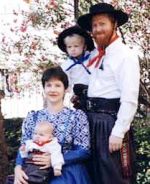
Faith
is more than a static goal for which we yearn. Faith is a journey in which we
experience God and seek to surrender our lives to God's will. Join with us on
this journey of faith. We will attempt to dialogue about issues that make
faith more than a static recitation of facts. We will question how the gospel
impacts our lives, sharing that journey of grappling with the issues of faith.
We hope to raise
questions, struggle with issues, and seek relevance in our experiential
journey of faith.
Faith, after all,
concerns things like character, dependence, and interdependence. It is so much
more than a goal we might reach. It is more like the very journey itself—the
experience of letting go of self in order for God to live through our lives.
We invite you to
journey with us. We hope it will challenge you. We hope it will encourage you.
We hope it will stretch you. The path we will take will not be without its
bumps, twists, and turns. It will not all be easy going. If it were so, it
would make no difference in our lives. As we journey together in this venture
called faith, we should all be transformed.
Are you up to the
challenge of living life on the edge of eternity? Real faith is not for the
faint of heart. We will not know where the journey will take us. We are
committed to the trek. Will you join us?
Editor's Note: Some readers will recall that
Chris and Karen Harbin, former missionaries in Brazil, were
fired from the International Mission Board of the Southern Baptist Convention
in 2002 for refusing to sign the Baptist Faith & Message 2000. Also,
the website of Central Baptist
Church contains many excellent resources.
Table of Contents
|
From the Pulpit: The Center for Baptist Studies recognizes the
critical role of the pastor in the life of the local congregation. Each September, the
Center co-sponsors the annual Mercer Preaching Consultation. For the
first half of this year, we present a special series of articles highlighting
the pulpit. Each month a different pastor will provide insight From the
Pulpit. This month Dr. William
Hardee, pastor of
Vineville Baptist Church in Macon, Georgia, shares From the
Pulpit."Prophetic
Preaching from a Baptist Pulpit"
By William Hardee
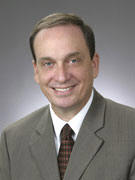
There is an old adage in pastoral ministry
which states, “One step ahead of your people and you are a prophet; ten steps
and you are a martyr.” This wise counsel reminds us of several important
insights. To begin with, we have to know our audience as well as we can.
We have to know where they are and then assess how open they are to hearing
new truth. Even Jesus illustrates this principle when teaching his disciples,
“I have many things to tell you but you
are unable to bear them (John 16:12).” Jesus would go on to say
that they would have the benefit of the Holy Spirit to guide them in their
struggles and adventures to know the truth.
The
preacher also needs to know if his or her congregation will see the pastor as
someone who can be trusted enough to lead them out of the safety of inculcated
doctrinal truisms into new places of insight with wider vistas. Most
people want doctrinal certainty and value conformity to their traditions more
than wanting and valuing the ambiguous, messy journey to truth. The
temptation for every pastor is to play it safe and speak only what people want
to hear. Yet our calling is to lead people to observe the life-teachings of
Jesus. Our ability to lead people to fresh springs is related to how
well we have proven our care and competence. We have to deeply invest
relational capital into people before we can begin spending the principal and
interest by challenging cherished ideas which are more informed by culture
than biblical truth.
Change
occurs best within congregations when the pace of change is slow. To
lead one step at a time is to be a true leader. The pastor/preacher must be
able to inspire people to see how God is active in each life and in the larger
world. Christians need to be reminded that we too are as guilty as ancient
Israel in believing that
faith in God results in being the
privileged people of God. What is often missing is a sense of
responsibility to represent Christ in personal ways to all who are
unbelieving. The primary biblical metaphor for the world is “lostness.” The
people of earth are not necessarily bad. Although evil is often brought
into the world through unbelievers, it is also conveyed through believers who
are motivated by fear, protective of privilege, defensive of God, and who
gloss over the shortcomings in their own lives.
Prophetic preaching is best received when the soil of the soul is not shallow,
hard, or thorny (Matthew 13). The preacher prepares the soil before he plants more difficult gospel seeds. He seeks to lift up the mirror of the Bible
which reveals our pride more than humility, our selfishness more than our
generosity, and our quest to fortify our privilege (through possessions,
position, patriotism, and piety) rather than giving away our life as Jesus
gave his.
When
the soil is prepared, then planting season arrives. When preaching on
Church and State, innocently reflect upon our love of asking God to bless
America. Why
should God bless
America? Point out
the good the bad and the ugly. Then close by saying, “We ask God to
bless
America, because
America desperately
needs God’s blessing—and so does the whole world.” When preaching on
homosexuality, be honest about the joys and struggles of our sexuality.
Speak pastorally and representatively about people in your own congregation
who have heard the painful words from a child confessing that they are gay.
Use Philip Yancy’s discussion of Mel White in his book, “What’s so Amazing
about Grace?” When preaching on other religions, remind people of Naaman the
leper, Isaiah’s vision of a faithful
Egypt and
Iraq (Isaiah 19:23-24), and
Nineveh. Remind your people of
God’s interest that justice prevail in
Nineveh, not that their theology
was correct. Preach yearly sermons on interpreting the Bible. Use the
early church’s experience in Acts 15 as they relied on common sense,
consensus, and the leadership of the Spirit to lay aside centuries of
tradition and set the Gentiles free to follow Jesus without being bound by the
Torah. The Bible is full of surprises for those willing to see. Help your
people to wander from the worn proof-texts to the delightful landscapes that
include Shiphrah and Puah. Restore to them the gift of wonder at Scripture.
Table of Contents
|
|
| |
|
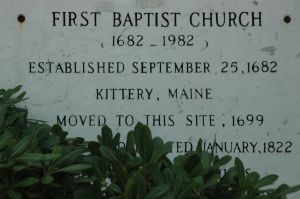
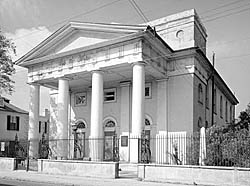
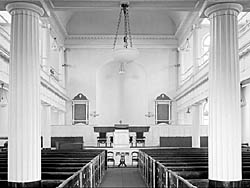
|
The Center for Baptist Studies Presents:
The Oldest Baptist Church
in the South
First Baptist Church
Charleston
South Carolina
Founded in 1682,
the "Mother
Church of Southern Baptists"
represents the beginnings
of Baptists in the South.
The current
sanctuary was
built in 1822, a Greek style
building considered to be
among the most beautiful
buildings in Charleston.
The building is
recognized
by the
National Park Service,
and you can visit the
church's
website to learn more about
this historic congregation,
past and present.
Photographs (top
to bottom):
Historical plaque on front of
church (photo by Bruce Gourley);
Front of church building (Library
of Congress photo); Interior of
Sanctuary (Library of Congress)
|
|
|
|
|
Baptists and Presidential Elections:
This series focuses on historical
Baptist responses and interactions during previous United States presidential
election years. This month's contributor is Doug Weaver. Doug is Director of
Graduate Studies of Baylor University's Department of Religion.
Baptists and Presidential Elections:
1928
By Doug Weaver
 Prior to
1928, Baptists had, of course, voted in presidential elections. In
the South, they especially contributed to the “Solid South”
Democratic Party. An unabashed mixing of religion and politics,
however, was considered a violation of the traditional Baptist
support for the separation of church and state. The candidacy of
Governor Alfred Smith of New York quickly changed the Baptist tune.
Baptists of all theological stripes, “fundamentalists” and
“moderates” who had been bickering over faith statements and
evolution throughout the 1920s, were on the same page in their
denunciations of the candidacy of Smith. In 1928, for example, the
Western Recorder (Kentucky) published almost 100 pieces
(articles, sermons, editorials) that were against Smith. While not
mentioning Smith by name, the Southern Baptist Convention and some
state conventions passed resolutions that asked their constituents
to vote against him. Prior to
1928, Baptists had, of course, voted in presidential elections. In
the South, they especially contributed to the “Solid South”
Democratic Party. An unabashed mixing of religion and politics,
however, was considered a violation of the traditional Baptist
support for the separation of church and state. The candidacy of
Governor Alfred Smith of New York quickly changed the Baptist tune.
Baptists of all theological stripes, “fundamentalists” and
“moderates” who had been bickering over faith statements and
evolution throughout the 1920s, were on the same page in their
denunciations of the candidacy of Smith. In 1928, for example, the
Western Recorder (Kentucky) published almost 100 pieces
(articles, sermons, editorials) that were against Smith. While not
mentioning Smith by name, the Southern Baptist Convention and some
state conventions passed resolutions that asked their constituents
to vote against him.
Why were
Baptists so vehement in their opposition to Smith? The centuries
old mutual hostility between Protestants and Catholics was a major
factor. In addition, Smith represented to Protestants every danger
embedded in the massive wave of Catholic immigration that had
occurred in America from 1880 to WWI.
·
(Catholic) Immigrants flocked to the
cities; they were blamed for the worldliness and growing crime rate that
accompanied rising urbanization.
·
“Rum” was synonymous with “Romanism.”
Catholics opposition to Prohibition would destroy the moral foundation of
American civilization.
·
“Romanism”: Catholics were not only
heretical—their denial of individual conscience was “tyranny over the
soul”—they were also anti-American. Their allegiance to a totalitarian papacy
meant that they could not support American democracy.
·
Massive immigration was a sign that
Rome’s real concern was temporal power; they wanted to take over America.
When that happened, Protestants would again be persecuted.
In short, most Baptists believed that Al Smith was an urban Catholic who would
defer to the Pope, implement Catholic dogma, and repeal the 18th
amendment to abolish Prohibition.
Baptist
fundamentalists spared no wrath in their sensationalism against Smith. John
R. Straton, fundamentalist leader of New York, said that Smith was a “good
cheap truck driver type of bar-room politician” who was the “deadliest foe in
America today of the forces of moral progress.” J. Frank Norris, leading
Southern fundamentalist, spoke 119 times in 30 cities in a four month period
in opposition to Smith. He warned against Rome’s lust for “foreign control,”
but he especially railed against the “liquor traffic” that Smith would unleash
on America if Prohibition was not upheld. One of Norris’ followers poetically
summarized the fundamentalist view of Smith:
I’ll
take down the flag from the public schools
And put up the
cross for the ignorant fools,
The Bibles in the
schools shall not be read,
But instead we’ll
say masses for the dead.
Even the more
“moderate” and rarely sensationalistic E. Y. Mullins, president of Southern
Baptist Theological Seminary, attacked the candidacy of Smith. Mullins’
change of heart revealed the pervasiveness of the Baptist concern. In 1919
Mullins had written that ministerial leadership in the civic arena should be
seen in the gift of mediation rather than partisanship. Ministers should not
champion from the pulpit a “radical” or a “conservative” program but should
help people to “understand each other.” When Smith became a candidate for
president, however, Mullins argued that preachers, while avoiding “mere
Partyism,” should be involved in politics when a significant moral issue was
being attacked by a political party. Prohibition, Mullins declared, was such
an issue. In late 1927, Mullins told the national convention of the
Anti-Saloon League that the “solid (democratic) south” would break if Smith
was nominated. In an anti-saloon tract, Mullins sarcastically noted that the
Democrats had nominated a “bone-dry running mate from Arkansas for the sopping
wet head of the ticket from the sidewalks of NY.” Unlike the Baptist
fundamentalists, Mullins focused only on Smith’s views of Prohibition and
denied that he opposed Smith because of his Catholic faith.
Republican
Herbert Hoover easily won the 1928 presidential election. In a letter to
Hoover after the election, Mullins hoped the South would play a larger role in
the nation’s life than had been possible since 1865. Historians have noted
that a Republican win was likely, given the economic prosperity of the day.
Nevertheless, it is interesting to note that the “solid south” did crack
during the election with Virginia, North Carolina, Kentucky, Tennessee and
Texas all landing in Hoover’s win column. Smith only carried eight states,
but they included South Carolina, Alabama, Georgia, and Mississippi.
Prohibition,
immigration, and religion had propelled Baptists into presidential politics.
Those issues, among others, are alive and well.
Table of Contents
|
|
|
|
|
|
Religious Liberty Annual Essay
Contest for High School Students
Sponsored by the Baptist
Joint Committee for Religious Liberty
WASHINGTON—To
engage high school students in church-state issues and to generate interest
from a wide range of Baptists, the Baptist Joint Committee for Religious
Liberty has launched the 2008 Religious Liberty Essay Contest.
Open to all Baptist
high school students in the classes of 2008 and 2009, the contest offers a
grand prize of $1,000 and a trip to
Washington,
D.C. Second prize is $500, and
third prize is $100.
Winners will be
announced in the summer of 2008 and will be featured in the BJC’s flagship
publication, Report from the Capital.
The grand prize winner will also be recognized at the BJC board meeting in
Washington,
D.C., on Oct. 6, 2008.
The topic for the
2008 contest is: In a 700-1000 word essay, discuss the relevance of
religious faith to politics, including whether and to what extent faith
should be an election issue in 2008. All entries must be postmarked by March
3, 2008.
New to the 2008
contest, students must have a submission coordinator review his or her essay
before submitting it. Coordinators must be a staff member from the student’s
home church and cannot be a parent. The coordinator reviews the essay to
ensure that it meets all the necessary requirements, is free of
typographical and grammatical errors and appropriately addresses the topic.
A submission coordinator may work with more than one student.
Essays will be
judged on the depth of their content and the skill with which they are
written. Students should demonstrate a sound knowledge of the subject matter
and support their assertions and provide bibliographical references. Essays
that do not meet the minimum qualifications will not be judged.
Judges reserve the right to present no
awards or to reduce the number of awards if an insufficient number of
deserving entries is received.
Visit
www.BJConline.org/contest to download registration materials
and a promotional flier. For more information, contact
Phallan Davis at 202-544-4226 or
e-mail her at pdavis@BJConline.org.
Table of Contents
|
|
|
|
Observations From the Intersections of Individualism and Ecclesiology:
Charles E. Poole recently returned to
the pulpit of Northminster Baptist Church, Jackson, Mississippi, following four
years of street ministry with LifeShare Community Ministries in Jackson.
"Chuck" Poole, a provocative preacher and servant pastor, has ministered to
both the poor and the privileged for over a quarter century. In addition to
Northminster, he has served First Baptist Church, Macon, GA, and First Baptist
Church, Washington, DC.
"At a Busy Baptist Corner"
By Charles E. Poole

Given my extensive experience as a crossing guard (Junior Deputy, Sixth Grade,
Joseph B. Riley Elementary School) and my impressive, albeit brief, spelling
bee career (who knew pneumonia started with a p?) I should have
known that the convergence of two six-syllable words might create one very
busy corner.
But that’s
the kind of corner where we Baptists build our churches. Baptist churches are
always located at the intersection of individualism and ecclesiology. Our
birth in the early seventeenth century was fueled, in part, by the rising tide
of individualism. “We believe what the Church teaches” was quickly being
overtaken by “I believe what the Spirit is leading me to believe.” John Smyth
and Thomas Helwys and scores of others would not be told what to think or how
to worship by any civil or ecclesiastical authority. That sentiment was not
unique to those Separatists who would eventually be called Baptists, but few
groups would more ardently embrace individualism than they, and we.
But we didn’t go
our separate ways as free-standing, disconnected individuals. We came
together to create congregations, and everywhere we started a church became
another busy intersection of individualism and ecclesiology. Our
ecclesiology, our way of thinking about and structuring the church, was
colored, of course, by our individualism. Congregational authority became the
corporate expression of our individual priesthood. (Each member makes up
their own mind. All members vote. The majority vote carries the day.)
So, four hundred
years later, how’s the traffic flowing at the busy intersection where
Individual Drive crosses Ecclesiology Avenue? In the coming months, we’ll use
this corner of the Baptist Studies Bulletin to ponder that busy Baptist
corner. Is biblical faith as individual as we sometimes make it sound?
And what about our churches? How can we think of them as autonomous in
governance while also embracing our connection to the far-flung,
globe-circling, centuries-spanning Church? Individualism and
ecclesiology: With that many syllables converging at a single corner, how
do we ever know if we’re putting the correct emphasis on the right syllable?
Table of Contents
|
|
|
|
|
|
Baptist Heritage Series: The
First Baptist Church of America:
As Baptists prepare to celebrate 400
years in 2009, this series
highlights America's First Baptist Church. J. Stanley Lemons
leads off the series. Lemons is the author of a history of
First Baptist entitled The First Baptist Church in America,
published in 2001.
"Passing on the Legacy"
By J. Stanley Lemons
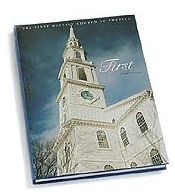
The First
Baptist Church in America has a tremendous heritage to share with
everyone. Gathered in 1638 by the “prophet of religious liberty,”
the church is as relevant as ever today. Roger Williams said that
it is blasphemous to speak of a nation as being a “Christian
nation.” Such an idea seeks to put God’s stamp of approval on a
secular entity. Williams pointed out that Christ’s church is based
on the love of God, while the nation is based upon the power of the
sword; if you mix the two, you corrupt religion.
The town government formed by Roger
Williams in Providence in the summer of 1636 separated religion from
citizenship—the first such place in the Western world to do so.
Church 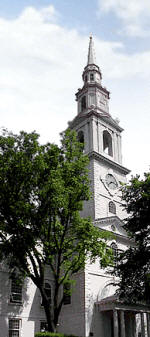 and state
were separated, and the government’s writ ran only to “civil
matters.” Now, it is particularly sad to see some Baptists clamoring
for the support of the state. Some want the state to endorse prayers
in the schools, to provide funding for church initiatives, to use
tax money to support their “Christian” academies, to promote
religion in public places and spaces. Roger Williams warned that
when the state tries to get involved in religion, the state will get
it wrong and will corrupt religious ideas and institutions. He saw
this as the clearest lesson coming from the conquest of the Roman
Empire by Christianity. What happened to the church when
Christianity became the official religion of the Empire? Who became
the persecutors? Is it any different when and where Baptists become
the majority? Some of our brethren have the idea that they have the
right, since they are the majority in some places, to use the public
money and places to promote their religious agendas. and state
were separated, and the government’s writ ran only to “civil
matters.” Now, it is particularly sad to see some Baptists clamoring
for the support of the state. Some want the state to endorse prayers
in the schools, to provide funding for church initiatives, to use
tax money to support their “Christian” academies, to promote
religion in public places and spaces. Roger Williams warned that
when the state tries to get involved in religion, the state will get
it wrong and will corrupt religious ideas and institutions. He saw
this as the clearest lesson coming from the conquest of the Roman
Empire by Christianity. What happened to the church when
Christianity became the official religion of the Empire? Who became
the persecutors? Is it any different when and where Baptists become
the majority? Some of our brethren have the idea that they have the
right, since they are the majority in some places, to use the public
money and places to promote their religious agendas.
Ours is
an old, downtown church that lacks a traditional neighborhood. Once
upon a time church members lived in the homes surrounding the
Meeting House, but today there are no homes. Our neighbors are other
institutions, such as the Art Club, business offices, and classroom and
administration buildings of the Rhode Island School of Design. The
Meeting House itself is a tourist attraction, but this is a mixed
blessing. We are listed in tourist guides and tour books, but the
emphasis there is on the architecture of the Meeting House. That
brings the tourists into the building, but they constantly ask, “Is
this still a church? Do you have regular church services here? Is
this a museum?” The answers are YES, YES, and NO!
How do
we promote our message at First Baptist? We have regular tour guides
to speak to the thousands of visitors to the Meeting House each
year. We are visited frequently by Elderhostel groups, and part of
our presentation is to emphasize the founding principles of
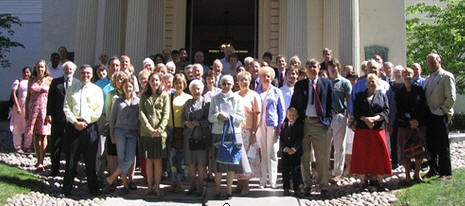 separation
of church and state. We regularly have Sunday school sessions about
Baptist history and concepts such as “soul liberty.” We have had a
number of speakers over the years from the Baptist Joint Committee
for Religious Liberty and the Alliance of Baptists. We have a highly
praised written history which emphasizes our principles, and this
book is available to the tourists and is read by the Brown
University archaeology classes that have been digging in the church
yard for the past two years. We help to train the docents for the
Providence Preservation Society and the Rhode Island Historical
Society, being particularly careful to have them realize that FBCIA
is a living church that still upholds the principles of Soul
Liberty, Freedom of Religion, and Separation of Church and State. separation
of church and state. We regularly have Sunday school sessions about
Baptist history and concepts such as “soul liberty.” We have had a
number of speakers over the years from the Baptist Joint Committee
for Religious Liberty and the Alliance of Baptists. We have a highly
praised written history which emphasizes our principles, and this
book is available to the tourists and is read by the Brown
University archaeology classes that have been digging in the church
yard for the past two years. We help to train the docents for the
Providence Preservation Society and the Rhode Island Historical
Society, being particularly careful to have them realize that FBCIA
is a living church that still upholds the principles of Soul
Liberty, Freedom of Religion, and Separation of Church and State.
Photos (top to
bottom): J. Stanley Lemons' history volume,
The
First Baptist Church in America; front view of the First
Baptist Church; members of First Baptist Church.
Table of Contents
|
The Spirituality of Baptist Leaders in Seventeenth Century America:
This series focuses on early Baptist
spirituality, offering insight from the past for today's Baptists. This
month's contributor is James P. Byrd, Associate Dean of Graduate Education and
Assistant Professor American Religious History at Vanderbilt
University."The
Spirituality of Baptists in Their Great Debate with the Puritans"
By James P. Byrd

A good debate is hard to
find. While this statement is certainly true of most political
seasons it is also true of history. Unfortunately, historians do not
come across many written debates between people of the past. But
when an authentic debate from a bygone era does surface, we gain
insights into how groups define themselves in opposition to one
another. Insults often fly back and forth between them; stereotypes
gain new life, and both sides of the debate most often
mischaracterize each other. But it is often both a glorious
spectacle and an extremely insightful event.
The great church
historian William McLoughlin published a debate that illuminates our
understanding of early Baptist history in America.* The debate took
place in April of 1668 in Boston, which was the center of Puritan
authority in Massachusetts. Over the space of two spring days, Puritan
leaders debated several of their own who had recently adopted views
the Puritans considered “Anabaptist.” Early Baptists in America had
to get used to being called Anabaptists – an identification they
denied fervently. The Baptists in Boston in April of 1668 were not
Anabaptists – far from it. In fact, several of the Baptist debaters
argued that they were more true to Puritan convictions than their
accusers. The result is a profound statement of early Baptist
identity, but not in the ways that we might expect. Religious
liberty was not the main issue, and church and state issues rarely
came up. Much more critical were topics of scripture, spirituality
and church practice.
A leader on the
Baptist side was Thomas Goold (also spelled “Gould”), a farmer
turned pastor who founded the first Baptist church in the area in
1665. Never mind that it was illegal to be Baptist in Massachusetts
at the time – again the fear of “Anabaptist” radicalism loomed
large. But the major issue under debate concerned separation from
the established church. Goold had been a member of a Puritan
congregation until his reading of scripture convinced him to reject
infant baptism – a conviction that was hard to keep quiet since he
had a baby daughter primed for sprinkling. When Goold founded his
illegal Baptist congregation, excommunication, fines and some jail
time followed, all leading up to this critical debate. Here,
finally, Goold and his Baptist colleagues would have the chance to
identify themselves and to defend their views in the faces of their
accusers.
When the debate
came, the intimate connections between Puritan and Baptist identity
came into sharp focus. Since the Baptists could not accept infant
baptism, they withdrew from the churches to worship among other
likeminded individuals. In so doing, Goold and others believed they
were just being good Puritans. After all, the Puritan movement
began, as the name indicates, as an attempt by some to “purify” the
Church of England of is unbiblical practices. When the Puritans left
England for America in the 1600s, they did so not to reject the
Church but to reform it by demonstrating how a church based on
biblical practices would look. Now the situation was reversed. As
Goold said to the Puritans, just as “you did withdraw from the
corruption” in the Church of England, in a similar way “we witness
against your corruption” (67). These Baptists, in true Puritan
spirit, felt obligated to inform their Puritan brethren that their
“Bible Commonwealths” were not so biblical after all. Though
Puritans claimed to be faithful to scripture in all of life, they
still baptized infants even though the New Testament said nothing
about infant baptism. Far from it – John baptized only adults, and
Baptist debater John Trumble pointed out that Jesus instructed his
apostles to teach “the doctrine of Christ” before baptizing anyone
(62). Baptism followed instruction and spiritual experience, not
the other way around.
The Baptists
in the debate spoke a lot about the relationship between
spirituality and liberty. In contrast, the Puritans countered with
claims for authority, especially need for the church to discipline
unruly members who challenged the established church and its
ministers. A key exchange came early in the debate between Goold and
Puritan minister Thomas Shepard, Jr. Goold asked whether a church
member could judge a church for its errors in the same way that a
church could discipline a member for his or her sins. Shepard
responded that “a particular person may not judge the whole; but is
to be subject to the whole” (63). Goold responded by holding up his
Bible and declaring, “we have nothing to judge but this,” insisting
that a spiritually-inspired reading of scripture trumped church
authority (63). Goold’s Baptist colleague John Turner echoed this
statement, adding that the Puritans could not “persuade us to sin
against God and the light of our own souls” (62). Further, John
Trumble told the Puritans that “we came for liberty of conscience as
well as yourselves” and, accordingly, we “look for light as well as
you” (71). The implication was that a people, even an individual,
inspired by God’s Spirit and informed by scripture had the duty to
worship accordingly, even if this form of worship was unauthorized
by the state. Part of the last statement we have in the transcript
is a telling assertion from Turner: “I challenge there is a liberty
given to every man to seek after the lord….” These Baptists defended
their claim to this liberty, which they believed was
biblical-informed, spiritually-inspired, and authentically Puritan
(92).
These
Puritan-tinged Baptists were neither the first nor the best examples
of the Baptist commitment to liberty in all its forms, including
civil, ecclesial, and individual. And yet these early Baptist
debaters had a solid grasp of liberty as a responsibility to live
biblically-informed lives in light of spiritual experience.
* William G. McLoughlin, Soul
Liberty: The Baptists' Struggle in New England, 1630-1833 (Hanover
and London: Brown University Press, 1991): 37-92.
Table of Contents
|
|
|
|
|
|
|
|
| |
|
Recommended Online Reading
for Informed Baptists
Compiled by Bruce Gourley
Vietnamese
Baptists to Hold First General Conference
Associated Baptist Press
Baptists are experiencing tremendous growth throughout the world.
Baptists in this Buddhist nation held their first national conference this
month.
Ministers Lose Job Tax Exemption in Kentucky County
Baptist Joint Committee
Ministers in a Kentucky county will no longer be granted an occupational
tax exemption after a local atheist sued to challenge the practice.
|
|
| |
|
| |
|
Dates to Note
January 30 - February 1, 2008, New Baptist
Covenant Celebration, Atlanta, Georgia. See advertisement above or
click here for
more information.
February 3, 2008, Martha Stearns Marshall
Preaching Day, sponsored by Baptist Women in Ministry.
Click here for
more information.
February 18-19, 2008, Mercer University's William
L. Self Preaching Lectures, Atlanta campus. Featuring Dr. Amy-Jill
Levine
E. Rhodes and Leona B. Carpenter
Professor of New Testament Studies of
Vanderbilt University.
Click here for
more information.
April 1-2, 2008, Urban Mission Workshop, McAfee
School of Theology, Atlanta, Georgia. Speakers include Rev. Joanna
Adams, Rev. Timothy McDonald, Rev. Tony Lankford and others. More
information is
available
online or by emailing Larry McSwain at
mcswain_LL@mercer.edu.
April 3, 2008, 25th Anniversary Celebration and
Judson-Rice Dinner honoring Walker Knight, Loudermilk Center, Downtown
Atlanta, 6:30 PM. Visit Baptists
Today online or call 1-877-752-5658 for more information.
May 22-24, 2008, Baptist History & Heritage
Society Annual Meeting, Mercer Atlanta campus. The theme is "Baptists
and First Amendment Issues." Visit
the BHHS website for more
information.
June 19-20, 2008, Annual Cooperative Baptist
Fellowship General Assembly, Memphis, Tennessee, Cook Convention Center.
Information
and registration.
July 16-19, 2008, British Baptist
Historical Society Centenary Conference, International Baptist Theological
Seminary, Prague. Theme: Baptists and the World: Renewing the Vision.
Keynote Speaker: Dr. Bill Leonard. If you have a proposal for a short paper,
email Dr. Ian Randall at Randall@ibts.cz
by March 1, 2008. Click here for more
information and registration information.
If you know of a Baptist event that needs to be added to
this list, please
let us know. For a full calendar of Baptist events, visit the
Online Baptist Community Calendar.
Table Of Contents
|
|
| |
If
you do not wish to receive BSB any longer, please
Click Here to unsubscribe. |